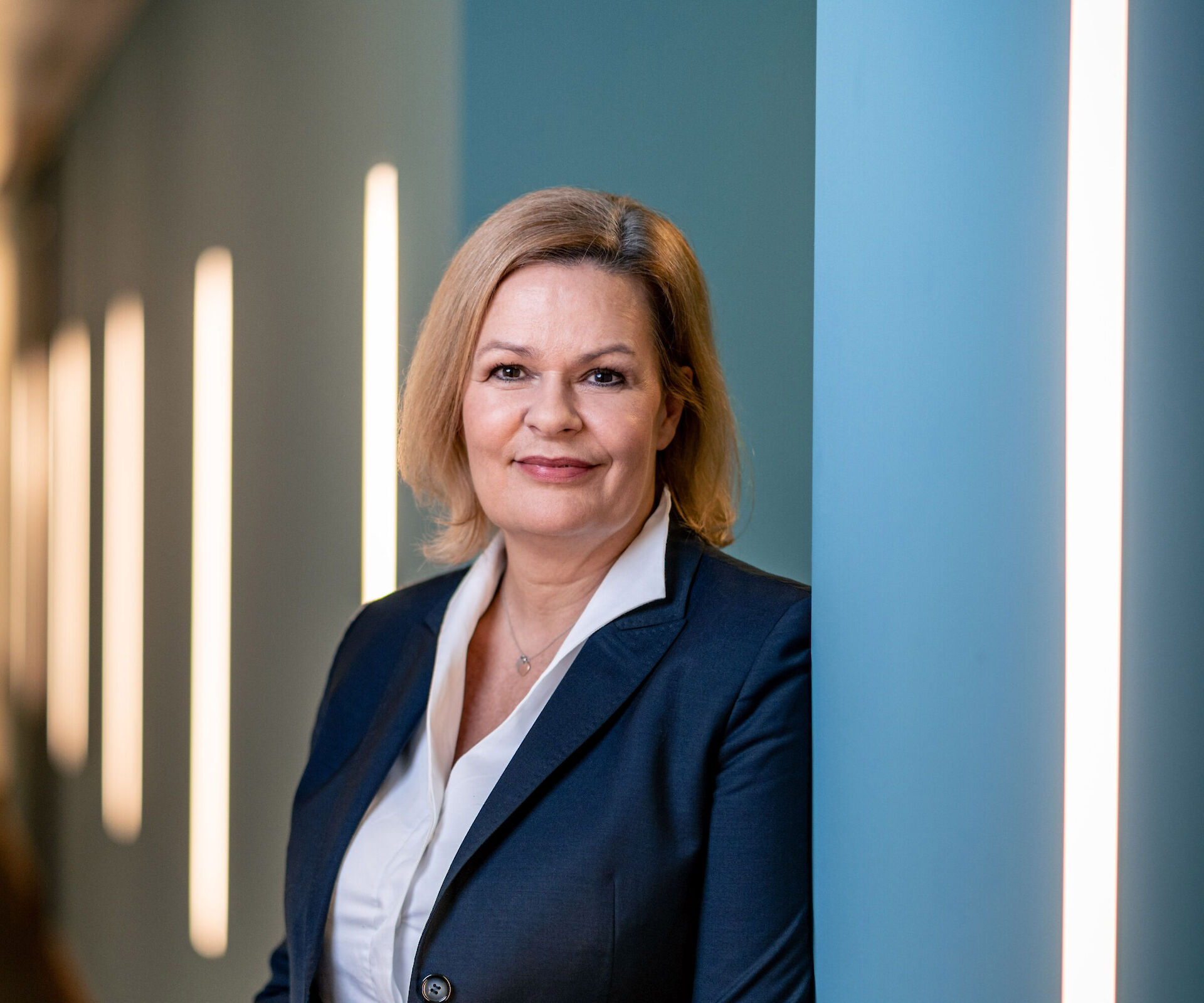

26 Apr 2024 15:43 Economy
Federal Minister of the Interior Nancy Faeser today received the First Mayor of the Free and Hanseatic City of Hamburg, Dr Peter Tschentscher, and his counterparts from Rotterdam, Ahmed Aboutaleb, and Antwerp, Bart De Wever, in Berlin. Migration Minister Eric van der Burg also attended on behalf of the Dutch government, representing Justice and Security Minister Dilan Yeşilgöz-Zegerius, while Ambassador Geert Muylle represented Belgian Interior Minister Annelies Verlinden. The exchange focused on the joint fight against organised crime and closer cooperation to strengthen security in European ports.
Like Federal Interior Minister Faeser, the three mayors had visited key cocaine source and transit countries in South America earlier this year to gain an impression of the fight against the transnational structures of organised crime and to intensify cooperation with South American partners.
Federal Minister of Home Affairs Nancy Faeser: "We want to step up the fight against international drug cartels. We must make our deep-sea ports so secure that they can no longer be used as gateways for tonnes of cocaine. Together with our security agencies, the German government will do everything in its power to achieve this. I am pleased that the mayors of Hamburg, Antwerp and Rotterdam are also so strongly committed to this and that we are acting together. This includes, for example, effectively combating corruption among companies in the ports. But it is also clear that we need to stop drug trafficking much earlier. We need a high level of investigative pressure along the entire logistics chain. That is why I have agreed with South American countries that we will work together to tackle the people behind the scenes and uncover the financial structures. On 7 May we will pool our efforts at a major conference with European countries in Hamburg.
Dr Peter Tschentscher, First Mayor of the Free and Hanseatic City of Hamburg: "Hamburg, Rotterdam and Antwerp are fighting together against the import of drugs through their ports and will take every opportunity to disrupt the cartels' supply chains. Drug smugglers are always looking for new channels, so we need a strong alliance between ports and national governments. Developments in Rotterdam and Antwerp have shown that drug use and smuggling go hand in hand with a dangerous expansion of organised crime as a whole. We must prevent this in Hamburg. The future port security centre, in which the Hamburg security authorities and the federal government will work together under one roof, is an important step in this direction. In addition, it is now important to improve the exchange of information with the security authorities in the countries of origin of the drugs and to strengthen the defence mechanisms of our ports. I would like to thank Federal Minister Faeser for her excellent cooperation".
Ahmed Aboutaleb, Mayor of the City of Rotterdam: "As port cities, we experience the serious consequences of international drug trafficking on a daily basis. Fighting it is not the job of mayors and municipalities, but we see it as our responsibility. We work with our police and customs authorities. But our national governments and the EU must also act quickly. If we do nothing, we will allow vulnerable parts of our cities to be taken over by organised crime.
Bart De Wever, Mayor of the City of Antwerp: "I am very grateful to Mayor Tschentscher and the Port of Hamburg for forming a strong alliance with Rotterdam and Antwerp. We must take a stand against drug-related crime in Europe and the corruption of our society by criminal money. Our ports are doing all they can to raise awareness of this major threat. I am therefore particularly pleased that the Federal Minister of the Interior, Nancy Faeser, has taken up the recommendations of Europe's three largest ports. It is vital that our national governments take up this fight and provide more manpower and resources. Police and judicial cooperation in Europe is also of the utmost importance. Only by working together in Europe and with the countries of origin in Latin America can we take decisive action against organised crime.
In recent years, the amount of cocaine seized in Europe, particularly from South America, has continued to increase. In 2023 alone, 35 tonnes of cocaine were seized in Germany, 59.1 tonnes in the Netherlands and 116 tonnes in Belgium. The major ports of Antwerp, Rotterdam and Hamburg are the gateways for illicit drug imports into Europe.
Germany is actively combating this trend and is supporting the efforts of port cities in particular. As part of the Coalition of European States against Serious and Organised Crime, Germany is working together with Belgium and the Netherlands on measures to increase port security across national borders. Close cooperation between the federal and state governments, as well as the police and customs authorities - both nationally and internationally - is essential. For example, the Federal Criminal Police Office is involved in the project "Infiltration of North Sea ports by organised crime structures", which aims to make ports more resistant to infiltration by criminals.
Along with Belgium, the Netherlands, France, Italy and Spain, Germany is a member of the European Coalition against Serious and Organised Crime. Federal Interior Minister Faeser will host the coalition's next ministerial meeting in Hamburg on 7 May, where port security and the resilience of logistics hubs will also play a central role.
Federal Minister of the Interior Faeser meets the mayors of Hamburg, Antwerp and Rotterdam.
Federal Ministry of the Interior and Community
Press Department
Phone: +49 30 18681-22222
E-mail: presse@bmi.bund.de